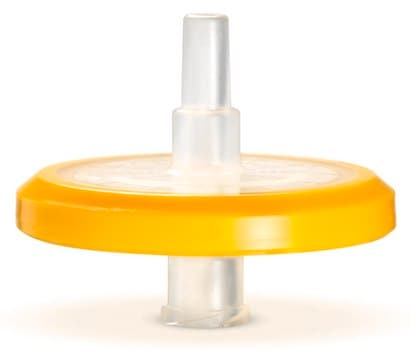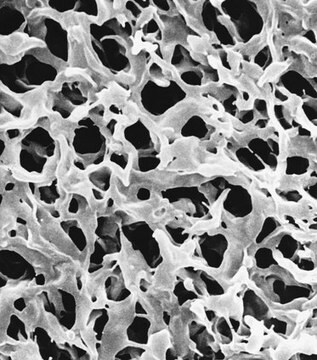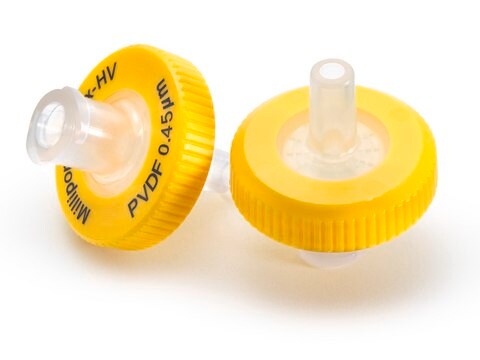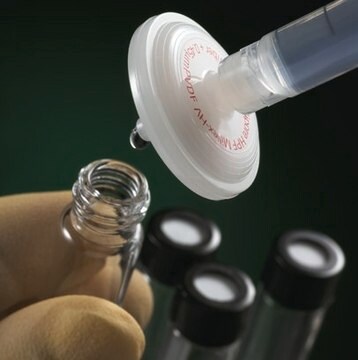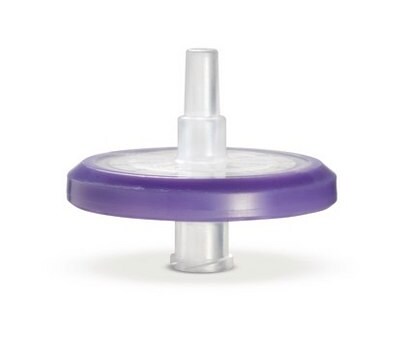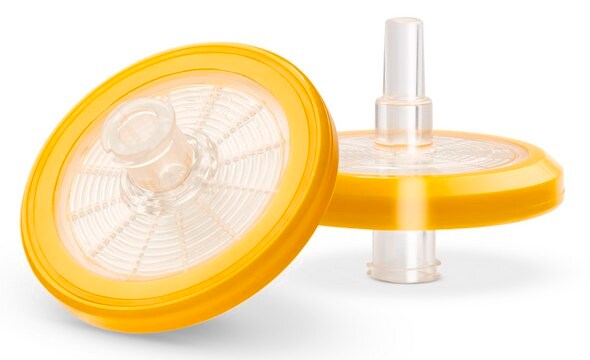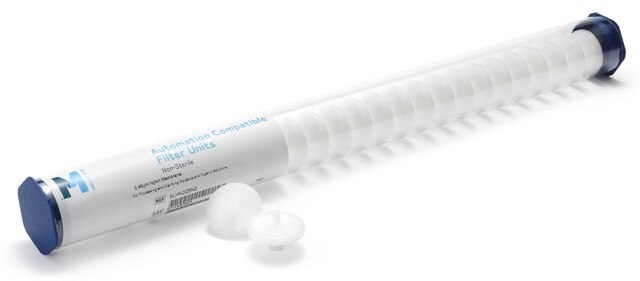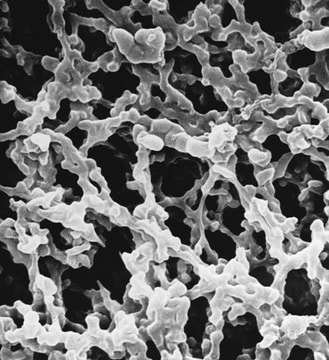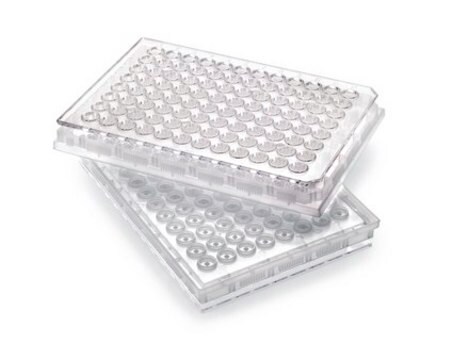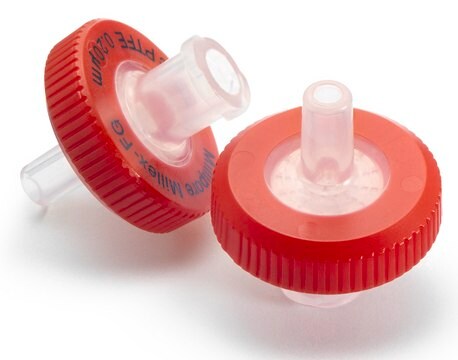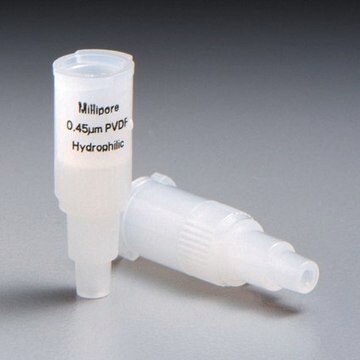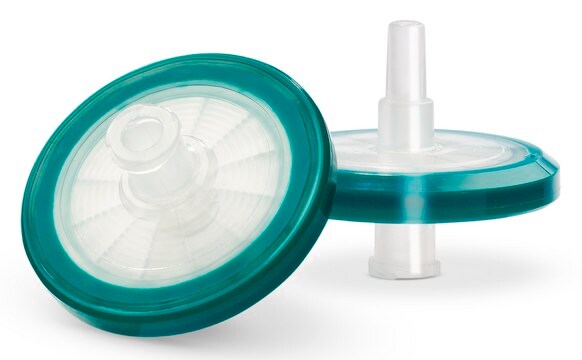SLHVX13NK
Millex® PVDF syringe filter
pore size 0.45 μm, diam. 13 mm, non-sterile, hydrophilic
Synonym(s):
0.45 μm PVDF syringe filter, Durapore® PVDF syringe filter, Millex-HV syringe filter, disposable syringe filter, syringe filter
About This Item
Recommended Products
material
PVDF membrane
polypropylene housing
Quality Level
sterility
non-sterile
product line
Millex®
feature
holdup volume≤ 15 μL (after air purge)
hydrophilic
manufacturer/tradename
Millex®
parameter
10 bar max. inlet pressure (150 psi)
101 L/min flow rate
101 mL/min-cm2 water flow rate
45 °C max. temp.
technique(s)
HPLC: suitable
UV/Vis spectroscopy: suitable
analytical sample preparation: suitable
low protein-binding filtration: suitable
H
21 mm
diam.
13 mm
filtration area
0.8 cm2
volume
10 mL
color
yellow
matrix
Durapore®
pore size
0.45 μm
input
sample type aqueous solution(s)
sample type mild organic solution(s)
bubble point
≥1.5 bar, air with water at 23 °C
fitting
female Luer-Lok® inlet
male Luer outlet slip
shipped in
ambient
General description
•Low protein binding to minimize interaction with your sample and maximize recovery
•Compatible with aqueous and mild organic solutions
•Available in 0.22 μm and 0.45 μm pore sizes and three diameters to suit your application needs
•Housing materials are either polypropylene or high density polyethylene (HDPE), offering low levels of extractables and broad chemical compatibility
Available in Multiple Pack Sizes:
SKU ending with NS (-------NS): 50 per pack
SKU ending with NL (-------NL): 100 per pack
SKU ending with TL (-------TL): 100 per pack. These syringe filters have a tube outlet
SKU ending with NB (-------NB): 250 per pack
SKU ending with NK (-------NK): 1000 per pack
Applications:
Sample Filtration Prior to UHPLC, HPLC, LC-MS, and Mass Spec; Solvent Filtration; Filtration of Biological Samples and Protein Solutions
Application
Packaging
Specifications
Physical form
Legal Information
Not finding the right product?
Try our Product Selector Tool.
Certificates of Analysis (COA)
Search for Certificates of Analysis (COA) by entering the products Lot/Batch Number. Lot and Batch Numbers can be found on a product’s label following the words ‘Lot’ or ‘Batch’.
Already Own This Product?
Find documentation for the products that you have recently purchased in the Document Library.
Customers Also Viewed
Articles
The most frequently used synthetic sweeteners are: saccharin, cyclamate, aspartame, and sucralose (E955), and this application illustrate the analysis of sucralose from soy sauce following the current Chinese national standard method.
Being one of the most popular flavors, we present a HPLC fingerprint method and vanilla extract reference materials to help distinguish natural from synthetic or adulterated vanilla.
Protocols
Under applied conditions, system suitability criteria are met, and the Chloroquine Phosphate HPLC Assay and Impurity Profiling Methods demonstrate good resolution/selectivity, reproducibility, and sensitivity.
Powdered black pepper was chosen as example for dietary supplements, being a source for pierine. It is tested according to the current United States Pharmacopeia (USP) guidelines using HPTLC and HPLC.
This paper illustrates the setting up of a Lopinavir assay following European pharmacopoeia guidelines (10.2), and using a shorter column packed with smaller particles. The described assay saves valuable time and improves separation efficiency, which typically translates to better method performance.
This application illustrate how Rutin can be determined in skin cream samples using a monolithic Chromolith® HighResolution RP-18 endcapped column with UV detection.
Related Content
A rapid, accurate, and simple method was implemented for the total chromatographic purity analysis of Fingolimod Hydrochloride by High-Performance Liquid Chromatography equipped with a Diode Array Detector.
Our team of scientists has experience in all areas of research including Life Science, Material Science, Chemical Synthesis, Chromatography, Analytical and many others.
Contact Technical Service